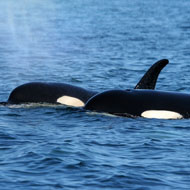Killer whale contained ‘highest level of PCBs’ ever recorded

There is growing concern that the effects being seen in this small group of whales could become apparent in more marine mammal species. (stock photo)
Scientists say a killer whale found dead on the Isle of Tiree in Scotland had one of the highest levels of PCB pollution ever recorded, a finding that bodes ill for the rest of her pod.
High levels of polychlorinated biphenyl (PCB) pollution are linked to poor health, infertility, impaired immune function and increased susceptibility to cancer. Once they get into marine environments, they accumulate through food webs and are difficult, if not impossible, to remove.
Well-known killer whale ‘Lulu’ was found dead in January 2016 after becoming entangled in creel rope, but subsequent investigations by the Scottish Marine Animal Stranding Scheme, which is managed by SRUC, shed new light on her case.
Analysis of the whale’s blubber revealed PCB concentrations 100 times higher than the accepted PCB toxicity threshold for marine mammals. Lulu was estimated to be around 20 years old, but analysis of her ovaries suggests she never reproduced, despite being much older than the average age of maturity in killer whales.
Veterinary pathologist Dr Andrew Brownlow said Lulu’s apparent infertility is an “ominous finding” and raises concerns about the rest of her pod. The small group of eight whales is usually seen off the west coast of Scotland. In the 23 years it has been monitored, not a single calf has been recorded.
“With no new animals being born, it is now looking increasingly likely that this small group will eventually go extinct,” Dr Brownlow said. “One of the factors in this groups’ apparent failure to reproduce could be their high burden of organic pollutants.”
Scientists are calling for a far more proactive approach to assessing and decontaminating PCB-contaminated sites, to stop these pollutants getting into the marine environment. Without this, there is growing concern that the effects being seen in this small group of whales could become apparent in more of our iconic marine mammal species.



 The Veterinary Medicines Directorate (VMD) is inviting applications from veterinary students to attend a one-week extramural studies (EMS) placement in July 2026.
The Veterinary Medicines Directorate (VMD) is inviting applications from veterinary students to attend a one-week extramural studies (EMS) placement in July 2026.